China reimposes partial lockdown in capital to tackle new cluster; US authorities revoke emergency use of hydroxychloroquine; two imported cases in NZ. Follow the latest updates
- New Zealand ends Covid-free run with two cases from UK
- Beijing lockdown tightens as new coronavirus outbreak spreads
- US revokes emergency approval of hydroxychloroquine for Covid-19
- Covid-19 can damage lungs of victims beyond recognition, expert says
- See all our coronavirus coverage
Updated
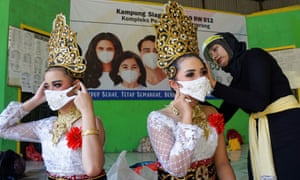
Photograph: Fajrin Raharjo/AFP/Getty Images
01:14
Thailand reports no new infections
01:05
New Zealand’s two new cases were travellers from the UK
00:24
Beijing bans ‘high-risk’ travellers from leaving city
23:36
German cases rise by 378
22:55
UK vaccine trials to start this week
22:46
Australia continues to ease restrictions
22:18
South Korea reports 34 new cases
05:44
Great news for British-based sausage roll fans:
05:32
Singapore will halt construction of the fifth terminal at its Changi Airport for at least two years to assess how the Covid-19 pandemic will impact the aviation sector and the future of travel, the city-state’s transport minister said on Tuesday.
The government was carrying out a study of how the aviation sector will change, and the design of new terminal would be altered to account for new safety requirements as well as changing needs of airlines, Khaw Boon Wan said.
“We have decided to take a pause for two years. Let us complete this study of the future of aviation,” Khaw said, according to an audio recording of his remarks on a video conference call provided by the transport ministry.
The fifth terminal was scheduled to be completed in the 2030s, and was to handle up to 50 million passengers per year in its initial phase. Changi was among the world’s busiest airports in 2019, with more than 68 million passengers.
04:53
The Yomiuriland amusement park in Tokyo reopened today, which was particularly good news for the one person who turned up to ride this rollercoaster:

… and the two people who climbed aboard this one:
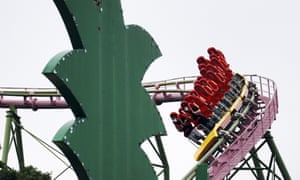
04:31
Hong Kong will let groups of up to 50 people meet from Friday, raising an earlier limit of eight people, after reporting only a small number of coronavirus cases in recent weeks, health secretary Sophia Chan has said. Hong Kong has reported a total of 1,113 cases and four deaths since the outbreak began in late January.
04:28
If you live in England this might be interesting and/or useful:
The government’s weekly Covid-19 surveillance reports for England can be found here. For those living or interested in other areas of the UK:
- There are some excellent data on the virus in Wales here.
- Data for Scotland is updated daily and can be found here.
- Ulster University runs a Covid-19 dashboard for Northern Ireland here, which takes some information from the NI department of health’s own dashboard here (but has some additional functionality). More information on coronavirus in Northern Ireland is available on the department of health website here.
Updated
04:09
AstraZeneca’s potential coronavirus vaccine is likely to provide protection against contracting Covid-19 for about a year, the company’s chief executive told a Belgian radio station today, reports Reuters.
The British company has already begun human trials of the vaccine developed by the University of Oxford, with a phase I trial in Britain due to end soon and a phase III trial already begun, Pascal Soriot told broadcaster Bel RTL. “We think that it will protect for about a year,” Soriot said.
AstraZeneca said on Saturday that it had signed contracts with France, Germany, Italy and the Netherlands to supply the European Union with up to 400m doses of the potential vaccine. It has also agreed deals with Britain and the US.
“If all goes well, we will have the results of the clinical trials in August/September. We are manufacturing in parallel. We will be ready to deliver from October if all goes well,” Soriot said.
Updated
03:55
Germany launched its coronavirus tracing app today, which officials say is so secure even government ministers can use it.
Smartphone apps have been touted as a hi-tech tool in the effort to track down potential Covid-19 infections. Experts say finding new cases quickly is key to clamping down on fresh clusters, especially as countries slowly emerge from lockdowns and try to avoid a second wave of infections and deaths.
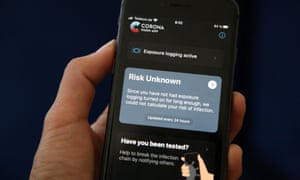
But governments in privacy-conscious Europe have run into legal and cultural hurdles trying to reconcile the need for effective tracing with the continent’s strict data privacy standards.
Germany, where a person’s right to their own data even after death is rooted in the constitution and even protects the privacy of convicted criminals, has proved a particular challenge.
The German government insists users will have full control over their data. There is no requirement to download the Corona-Warn-App. It’s up to the user to confirm their test results and trigger the process of informing possible contacts that they might in turn have been exposed.
Still, concerns remain. A poll this month published by the public broadcaster ARD found that slightly more Germans (42%) said they would use the tracing app than the 39% who said they wouldn’t. The rest either said they didn’t have a smartphone or hadn’t made up their mind.
Updated
03:37
Russia has reported 8,248 new coronavirus cases today, bringing its nationwide infection tally to 545,458. The authorities said 193 people had died of the virus in the last day, raising the official death toll to 7,284.
03:22
The wife of Ukraine’s president, Olena Zelenska, has been hospitalised after contracting coronavirus and her condition is stable, the presidential office said today. Zelenska said last week she had tested positive for coronavirus, while her husband, Volodymyr Zelenskiy, and their two children had tested negative.

Updated
03:14
I completely forgot to introduce myself this morning/evening/whatever-it-is-where-you-are. How very rude. This is Simon Burnton taking on the live blog for the next few hours. If you have seen any stories that deserve our attention, or if you have any tips, comments or suggestions for our coverage then please let me know by sending me a message either to @Simon_Burnton on Twitter or via email. Thanks!
02:49
Spain is considering imposing a quarantine on visitors from the UK when it opens its borders next week in reciprocity to a similar measure imposed by London, the Spanish foreign minister, Arancha González Laya, has told on the BBC. “We will be checking what the UK will be doing and we will be in a dialogue with the UK to see whether or not we should be introducing reciprocity as they have different measures than the rest of the European Union,” González Laya said.
Updated
02:45
An Israeli company has developed technology that can identify and locate Covid-19 outbreaks by sampling sewage. This is from the AFP:
An Israeli company is monitoring coronavirus traces in a coastal city’s sewers and hopes to deploy its technology more widely to provide early warning of future concentrations of the respiratory disease.
Ari Goldfarb saw a unique opportunity to test the limits of underground technology developed by his firm when coronavirus patients were moved into a hotel in Ashkelon taken over by the government.
Fixated by wastewater since seeing raw sewage streaming into the sea while surfing as a teenager, Goldfarb founded the firm Kando initially to pinpoint industrial waste in the city’s labyrinthine municipal sewage system.
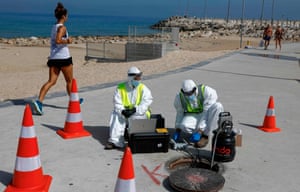
Eight years on, the company’s network of sensors, autosamplers and controllers placed under manholes in Ashkelon are tracing coronavirus.
In May, Kando partnered with scientists and mathematicians in Israel, Europe and the United States to embark on a month-long pilot to determine the accuracy of their technology.
The findings, said Goldfarb, conformed with the health ministry’s data showing the breadth and the near-exact location of confirmed virus carriers, including the hotel used by patients.
“We’re the only one who can tell where the outbreak is and how big the outbreak is in the city,” said Goldfarb.
Sewage has also been tested in cities like Melbourne, Paris, Tokyo, Amsterdam, Valencia and the US state of Massachusetts – although mostly on a small scale and without precision.
Kando’s manhole sensors can measure the flow of wastewater and how far it has travelled, using algorithms to determine the best moment to automatically collect samples.
They are then analysed at a number of laboratories, with the findings instructing the firm on the direction to follow within the sewage system’s pipes to reach the source of the virus, Goldfarb said.
Scientists around the world have already detected Covid-19 in patients’ stools within sewage systems, but can only provide a general reading of the presence of the virus in a community.
Kando’s technology can go further, according to Goldfarb, by giving a more precise location of an outbreak, potentially helping authorities control diseases.
With many coronavirus cases being asymptomatic, broad wastewater checks could pin down the virus before it spreads widely.
The technology can detect the virus “in the sewage (of) asymptomatic people, so we know about a new outbreak before it really happens”, said Goldfarb.
Kando’s technology already proved successful in helping authorities contain a 2013 polio outbreak in the southern town of Hura, he said.
Some of the samples are tested at Ben Gurion University in the southern Israeli city of Beersheba, where researcher Karin Yaniv inserted a tray of samples gleaned from sewage into a machine.
The adjacent computer screen lit up with lines indicating the presence of Covid-19 in the samples.
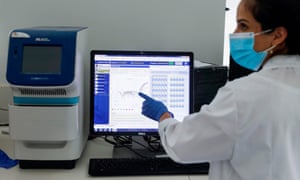
Although Yaniv saw “challenges going through the raw sewage”, due to the amount of other materials, she was convinced it is the best way to forestall a virus outbreak.
It is also more practical than trying to test the entire population regularly and, once the technology is in place, it can be used to detect other diseases.
“If you have a platform to detect viruses, specifically corona, we can use the same platform for other viruses,” said Yaniv, a PhD researcher at the university’s biotechnology engineering department.
After the Ashkelon pilot, a number of Israeli municipalities have expressed interest in the technology, but authorities have not commissioned Kando to roll out the project more widely.
As well as the health benefits, Goldfarb is hopeful his firm could prevent a repeat of the sweeping economic shutdown which was imposed to stop the spread of coronavirus.
“Decision-makers can take decisions based on data and they can close specific areas,” he said. That means “people will not lose their jobs, that means that people will have a better future – (and) the next outbreak will be managed much better.”
Updated
02:22
New Zealand has suspended exemptions for people in managed isolation on compassionate grounds, after two women who were allowed to drive from Auckland to Wellington to visit a dying relative later tested positive for Covid-19.
Currently travellers who arrive in New Zealand and show any known symptoms of coronavirus are placed in quarantine, while those who declare no symptoms spend 14 days in managed isolation, staying in a hotel with other people in a similar situation, and allowed to leave only when accompanied by security personnel. You can read a description of managed isolation here. According to New Zealand’s ministry of health, there are 155 people in quarantine and 3,412 in managed isolation. In the last week, 216 people applied for an exemption, and 90 were approved (there is a tailback of 311 cases in process).
“Compassionate exemptions should be rare and rigorous and it appears that this case did not include the checks that we expected to be happening. That’s not acceptable,” said the health minister, David Clark. “Our border measures are a key line of defence against Covid-19 and we must ensure they are as robust as possible.
“The director general will be reviewing the processes around these latest two cases, noting that he has already made it a requirement that all individuals must return a negative covid test before leaving managed isolation facilities from now on.”
Updated
02:05
Summary
I will be handing over to my colleagues in London shorty, so here’s a summary of the main stories over the past few hours.
- New Zealand has recorded two new cases of Covid-19, their first cases in weeks. The two women, who are related, had travelled from the UK and were released from government quarantine and allowed to drive 650km from Auckland to Wellington on compassionate grounds.
- China has banned high-risk travellers from leaving Beijing. The move comes after a further 27 cases were reported in the cluster connected to a market in the city. A total of 106 cases have been diagnosed since Thursday. All high-risk people in Beijing, such as close contacts of confirmed cases, are not allowed to leave the city. Authorities described the city’s coronavirus outbreak as “extremely severe” as dozens more cases emerged, sports and entertainment sites were closed.
- Global cases have passed 8 million, according to the Johns Hopkins University tracker. It said there were now 8,018,742 cases and 436,406 deaths across the world.
- The US Food and Drug Administration has revoked its emergency use authorisation for hydroxychloroquine to treat Covid-19, the drug championed by president Donald Trump. Despite the FDA’s actions, the president said on Monday other countries had provided great reports on the effectiveness of the drug on Covid-19.
- A study has estimated 20% of global population is at risk of serious illness if infected with Covid-19. An estimated 1.7 billion people risk becoming severely infected with Covid-19 due to underlying health problems such as obesity and heart disease, according to analysis carried out by the London School of Hygiene and Tropical Medicine and published in the Lancet medical journal.
- South Korea has reported 34 new Covid-19 cases. It’s the third day in a row its new infections tally has been below 40. South Korea has been one of the most successful countries in fighting the coronavirus pandemic, but recent clusters around the capital have caused concern, and a two-week period of toughened prevention measures in Seoul has been extended indefinitely.
- UK vaccine trials to start this week. Scientists will begin testing another possible coronavirus vaccine on humans this week. Researchers at Imperial College London will begin clinical trials in 300 people to see whether their jab produces an effective immune response against Covid-19. The healthy participants, aged between 18 and 70, will all receive two doses of the vaccine over the coming weeks, and the hopes are that tests could then move on to 6,000 volunteers if they are successful.
- Thailand reports no new infections. On Tuesday, the country reported no new coronavirus infections or deaths and marked 22 successive days without a domestic transmission.
- Some US-China flights to resume. The US and China will each allow four weekly flights between the two countries, the US Transportation Department said on Monday, easing a standoff on travel restrictions in the midst of the novel coronavirus pandemic.
- Mexico passes 150,000 infections There are now a total 150,264 confirmed coronavirus cases and 17,580 deaths, though the government has said the real number of infected people is likely significantly higher than the official count.
- Washington University predicts that US infections could pass 200,000 by October. The forecast projects 201,129 deaths in the US due to Covid-19 by October, mainly due to the reopening measures under way, the Institute for Health Metrics and Evaluation (IHME) at the University of Washington said on Monday. It’s an 18% rise on its previous estimate. It said Florida would be among the hardest hit states, with an estimated 18,675 deaths, up 186% from a previous estimate. The institute raised its estimate for deaths in California by 72% to 15,155 and increased its outlook for Arizona by 56% to 7,415 fatalities.
Updated
01:40
Let’s take a quick look at that the British papers are saying about coronavirus this morning … and the Guardian’s headline is “Lengthy queues as shops in England reopen” alongside a large photo of the crowds.
Alison Rourke
(@AlisonRourke)The Guardian’s front page coronavirus stories on 16 June. pic.twitter.com/bpAVBeRuip
June 16, 2020
The Times and the Scotsman both focus on education, with “Millions of pupils doing no work” and “Parents lead backlash over ‘chaotic’ back to school plan”, respectively.
Neil Henderson
(@hendopolis)THE TIMES: Millions of pupils doing no work #TomorrowsPapersToday pic.twitter.com/Tf4ysKBG4O
June 15, 2020
Neil Henderson
(@hendopolis)SCOTSMAN: Parents lead backlash over ‘chaotic’ back to school plan #TomorrowsPapersToday pic.twitter.com/HuaTZpC6Q5
June 15, 2020
The Telegraph quotes former Tory leader William Hague saying “Lockdown a ‘disaster for society’”.
Neil Henderson
(@hendopolis)TELEGRAPH: Lockdown a ‘disaster for society’ says Hague #TomorrowsPapersToday pic.twitter.com/IJ0BcgZ6yA
June 15, 2020
The i has “Retail therapy aids stricken UK economy”, while the FT says “Retail renewal draws crowds”.
Neil Henderson
(@hendopolis)I: Retail therapy aids stricken UK economy #TomorrowsPapersToday pic.twitter.com/qRk6s1kgOl
June 15, 2020
Neil Henderson
(@hendopolis)FT: @BorisJohnson and EU pledge revival in trade talks to seal post-Brexit deal #TomorrowsPapersToday pic.twitter.com/q7EMng9mTF
June 15, 2020
01:14
Thailand reports no new infections
Thailand on Tuesday reported no new coronavirus infections or deaths and marked 22 successive days without a domestic transmission.
The country has recorded a total 58 deaths related to Covid-19 among some 3,135 confirmed cases, of which 2,993 patients have recovered.
It was the third time in six days that no cases were reported. All recent cases have been found in quarantine among Thais returning from abroad, said Panprapa Yongtrakul, a spokeswoman for the government’s Covid-19 Administration Centre.
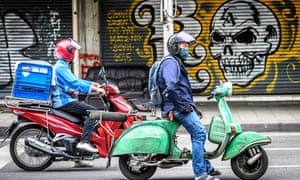
Updated
Newest
Newer
Older
Oldest


